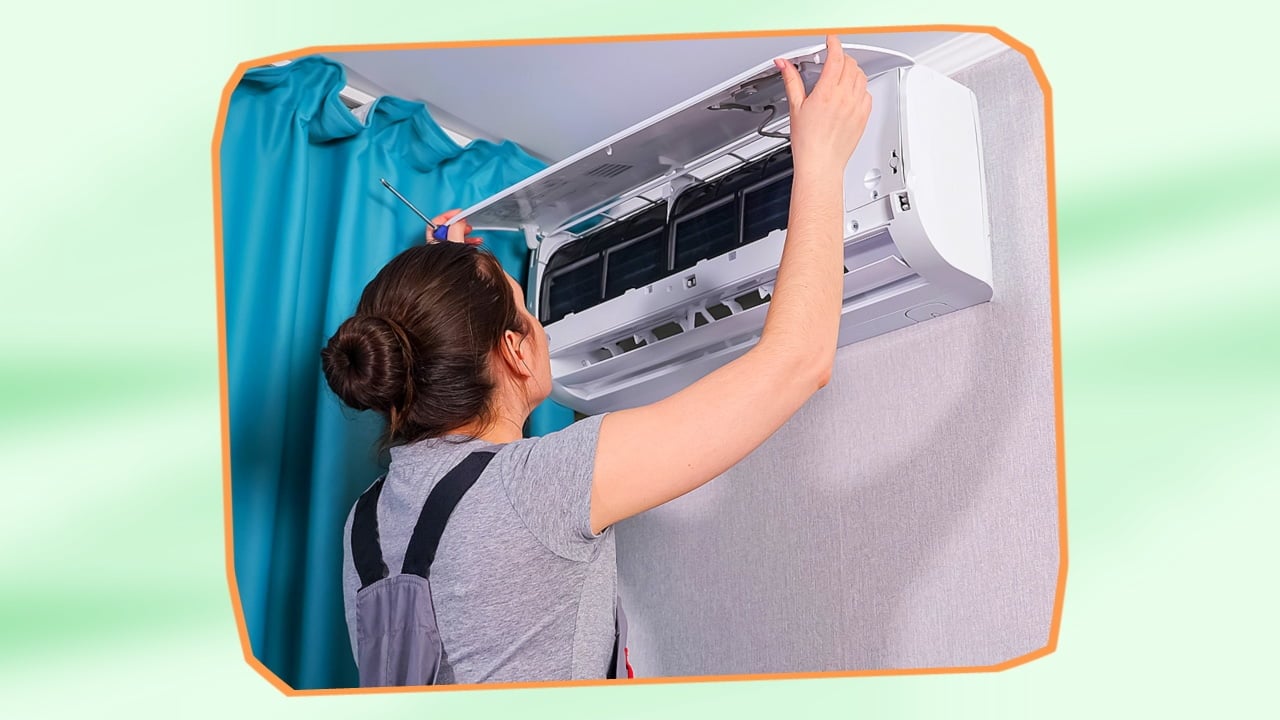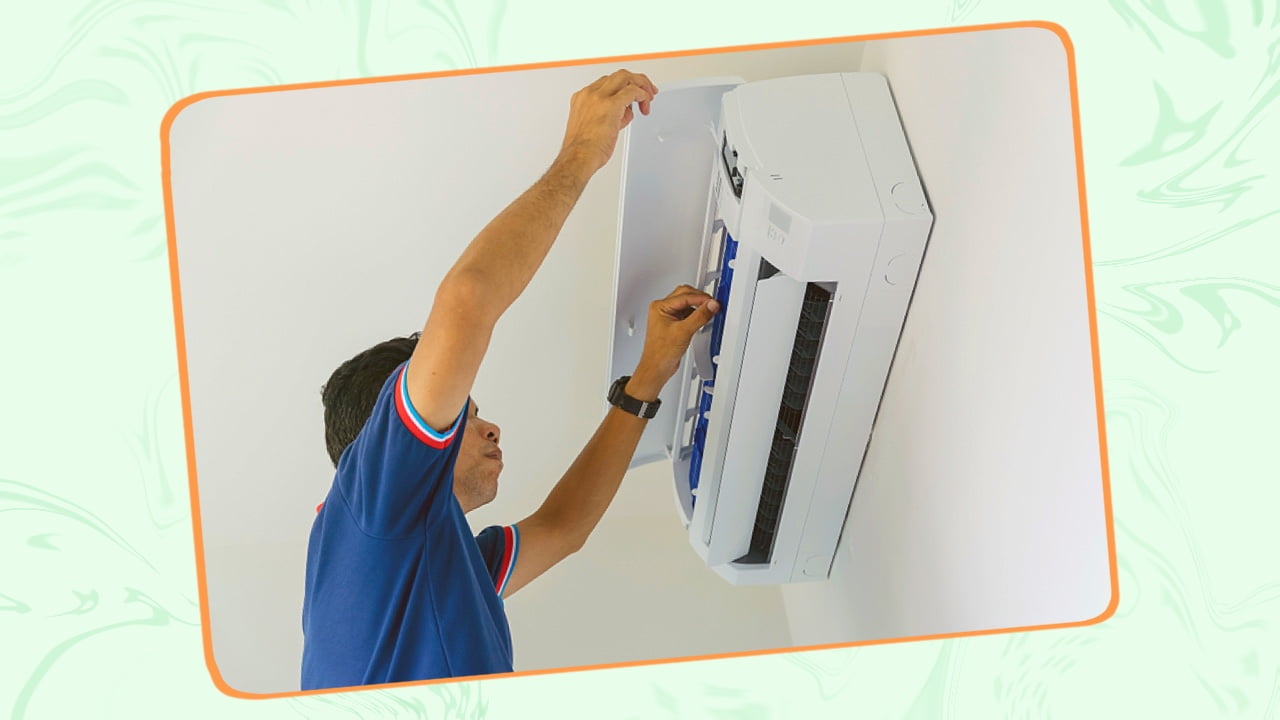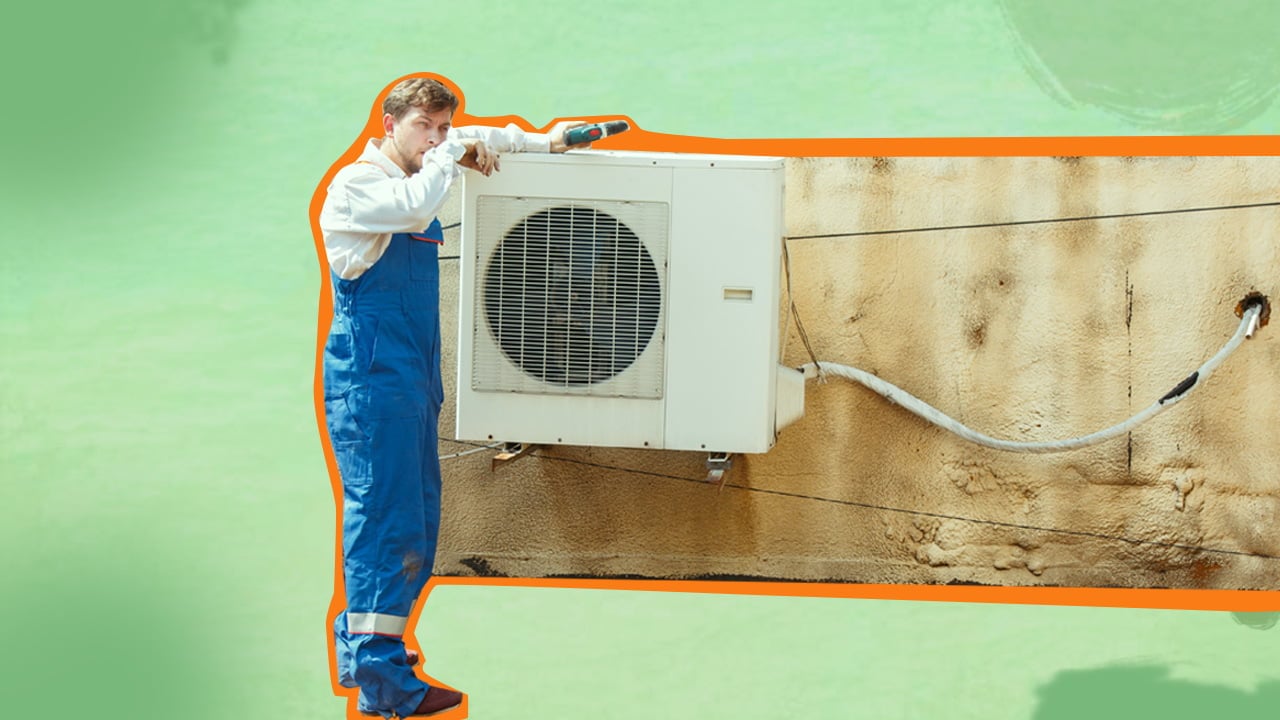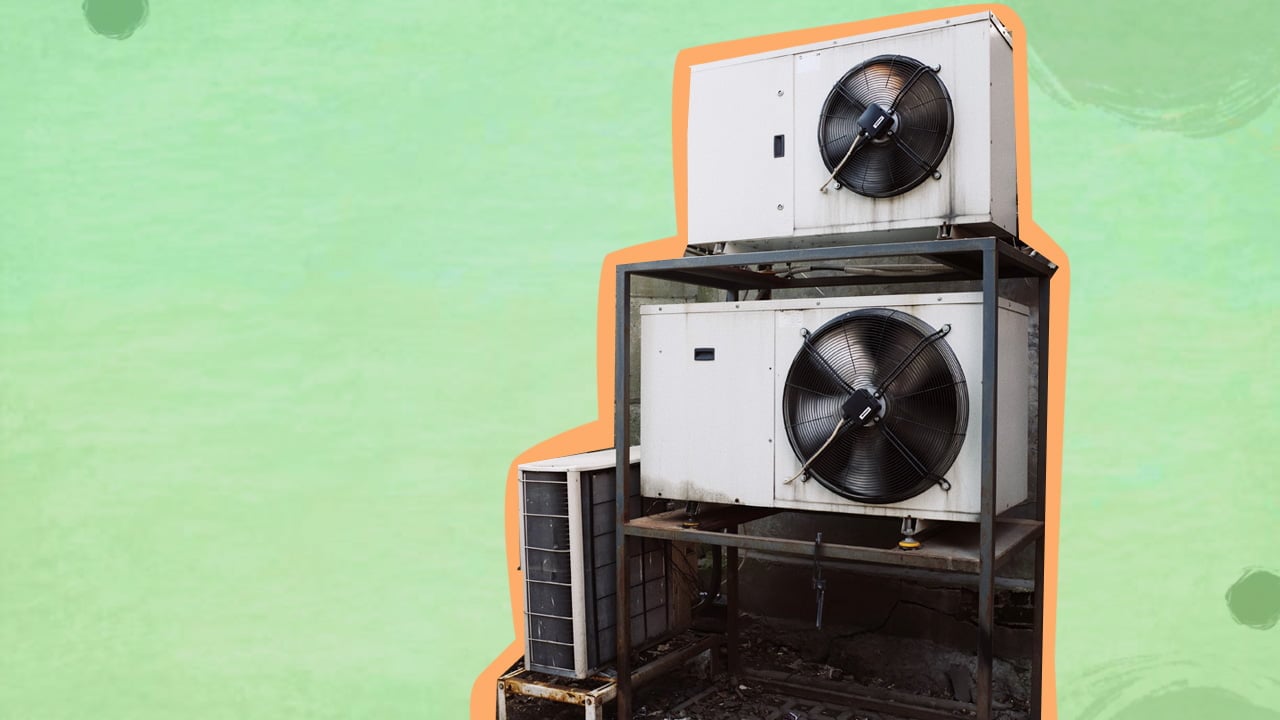Air conditioners make rhythmic pulsating noises (also known as harmonics) when the air filters become dirty. The pulsing sounds also occur due to leaking refrigerants, a faulty blower wheel, or a malfunctioning compressor.

It’s natural to worry when your AC starts making a loud noise when you switch it on to cool your room.
Now, if the air conditioner is making a pulsating noise, you should see where the sound is coming from. After all, there could be several reasons behind this problem. And it’s best to identify the issue and get it fixed as soon as possible.
In this guide, I’ve explained some of the most common reasons your air conditioner may be making pulsating noises. I’ve also highlighted a few other common AC noises and their possible causes. Lastly, you can refer to the FAQ section for any other query you might have.
Causes Behind An Air Conditioner Making A Pulsating Noise

1. A Dirty Air Filter
Sometimes the pulsating noise from the air conditioner can be due to a minor issue, such as a clogged air filter.
Now, the filter in an air conditioning system is usually made of paper or cloth. And its main purpose is filtering the air inside the room by removing pollen, dust, and other allergens. These particles get trapped inside the air filter leading to clogs.
Consequently, the dirty filter will obstruct airflow, causing the air conditioner to run longer and work harder to cool the room. This will cause the AC unit to vibrate and emit pulsating noises.
So, make sure you clean the filter or replace it regularly to overcome the problem. After all, a clean filter will not only prevent strange noises but also enhance the energy efficiency of the unit. You will save money on electricity bills and rest assured that the unit will last long.
Moreover, a dirty filter may emit a foul odor that isn’t desirable in any way.
2. Faulty Or Damaged Blower Wheel
The blower wheel is another crucial component of the AC that’s attached to the blower motor. It features fan blades that spin while the fan motor is operational to move air through the duct system so that the room cools down.
But like the air filter, the blower wheel also tends to get dirty with dust or grease build-up. As such, it starts rotating slowly, reducing the volume of air that circulates through your home. Or, your blower wheel might get damaged due to reasons such as old age, electrical failure, and failed bearings. Furthermore, the fan blades may be bent, warped, or broken, causing the AC unit to work inefficiently.
In such instances, the air conditioner will start making pulsating noises while working harder to ensure efficient cooling. So, make sure you get the AC serviced regularly to check for a worn-out or dirty blower wheel and get it cleaned or replaced as required.
3. Refrigerant Leaks
The refrigerant in an air conditioner helps absorb heat from your home and transfer it outside. But if there’s a refrigerant leak in the AC system, the compressor will start making a pulsating noise. This is because the lower refrigerant level will make the AC work harder to ensure optimal cooling.
Tip
Contact heating, ventilating, and air conditioning (HVAC) professional to locate and fix the refrigerant leak. They are equipped with all the right tools and experience to fix the leak and recharge the air conditioner with the required amount of refrigerant.
4. Faulty Or Broken Compressor
The AC compressor is the component of the air conditioning unit that’s responsible for circulating the refrigerant throughout the system. But the air conditioner won’t work efficiently if it’s broken or damaged. So, if you’re hearing constant pulsating noises, it could be a faulty air conditioning compressor.
Here are a few signs that your AC compressor might be having issues:
- Tripping circuit breaker
- Weird noises from the outdoor unit
- Ice or frost on the condenser coil
- Increase in electricity bills
- The air conditioner isn’t cooling as it should
5. Problems Related To The Condenser
Your AC compressor might not function as it should because of a dirty condenser fan. As such, your air conditioner is more likely to make a pulsating noise.
I’d recommend scheduling regular AC maintenance services to prevent this problem. The professional will clean the condenser coils and fan blades so that the cooling cycle remains unhindered.
Why Is Your Condenser Fan Not Working?
Your condenser fan may be spinning slowly or may not be spinning at all. When this happens, your air conditioner will make strange noises. But why does this happen?
I’ve highlighted the two most common reasons behind this problem:
A. Capacitor Failure
An overheated capacitor will eventually fail, causing condenser fan issues. This is why it’s important to get an AC specialist to routinely service the air conditioning system. They will know when the capacitor is starting to get worn out and replace it before it goes into complete failure.
B. Worn-Out Fan Motor
The condenser fan will also get damaged when the capacitor fails.
6. Air Conditioner On Plastic Pads
If your AC unit is on a plastic pad, the motion of the compressor will transfer to the plastic, creating a pulsating or humming sound. You can tackle this problem by sound-insulating the compressor. Or, use a wood pad or platform to minimize the sound.
Another reason is the refrigerant line coming in contact with the wall. In this case, you should move the refrigerant line away from the walls or add rubber or foam insulation. This should prevent the AC from making pulsating sounds.

A Few Other Common Air Conditioner Noises And Their Causes
Here are a few other air conditioner noises that you should know about:
1. Clanking
Similar to the air conditioner pulsating noise, clanking indicates a loose or misaligned AC part. This may happen because of a failed or faulty component or a loose compressor. You should also check the blower fan blades to see if they are out of balance or warped.
2. Loud Buzzing Noise
Your air conditioner might be making a loud buzzing noise due to any one of the following reasons:
A. A Faulty Compressor
Advice
It’s better to get the entire condensing unit replaced in this case. This will ensure better utilization of the money being spent than just getting the compressor changed.
B. Bad Capacitor
Advice
Take a stick or something that won’t conduct electricity to try and get the fan blade moving. If it does start operating, you will need to get the capacitor replaced.
C. Faulty Contactor Switch
The function of the contactor is to switch the electric circuit of the AC on or off. But when it malfunctions, you will hear loud buzzing or soft humming noises.
Advice
While you may attempt to replace the contactor yourself, it may be better to contact a professional AC technician for the job. They won’t charge much to get the switch replaced.
D. Vibrations
The parts of the AC that prevent vibration in the system may come loose over time. As a result, you might hear vibration noises that sound a lot like buzzing sounds.
3. Banging Noises
In case the outdoor unit of the air conditioner is making a banging or rattling noise, the problem might be a broken part of the compressor or fan. And that’s not exactly the best news, as getting a compressor replaced is costly. I’d recommend investing in a new HVAC system if it’s already more than ten years old.
If it’s the fan motor causing trouble, you can get it fixed for less than $700.
Now, moving to the indoor unit, if you notice the rattling or banging noise coming from the air handler, it might be an imbalanced or broken fan motor. In that case, I’d suggest reaching out to a professional to check it out. After all, inspecting a broken or imbalanced indoor blower while it’s operating can lead to serious injuries.
4. Whistling Sound
Air passing around the furnace or air handler causes the AC unit to make a whistling sound. This is also often the result of a clogged filter. After all, when air is unable to pass through the filter, the blower motor will work harder to pull the air into the unit. Consequently, you will hear a whistling sound. But the solution to this problem is simple - change the air filters!
Another cause of this problem is a leaking duct, which leads to air loss. So, make sure your AC ducts are sealed, wrapped, and insulated.
5. Hissing AC Noises
If your AC is hissing, you most likely have a refrigerant leak. The refrigerant line must be damaged, or the connection might have come loose over time. So, always call an HVAC professional as soon as you notice the AC unit making hissing noises. They will find and repair the leaking refrigerant line as soon as possible so that the room doesn’t get uncomfortably hot.
6. Squealing Or Squeaking AC
Malfunctioning motor bearings result in squeaking, squealing, or grinding noises. If the noise is coming from outside, the problem lies with the fan motor bearings of the condenser unit. And if the sound is indoors, check the bearings of the motor blower.
The issue can be fixed the DIY way if you follow the right instructions and safety precautions. Or, take an estimate from an HVAC repair service contractor.
7. Popping Noise
Ice formation inside the AC unit may cause loud popping noises. This happens when AC sensors malfunction or the unit fails to drain properly. In fact, you will most likely hear unusual sounds coming from the air conditioner if there’s water leaking inside the unit.
This problem should be tackled at once by a professional as the water may cause even more damage if it comes in contact with other sensitive parts of the AC.
Start by calling a professional when you notice your air conditioner making noise. If they check the HVAC unit and find nothing wrong with it, you can opt for ways to soundproof the outdoor unit. Here are a few ideas you can incorporate: Not all AC noises are a cause for concern. Here are some typical sounds that air conditioners make: AC refrigerant cycles between the indoor and outdoor coils, which the compressor pushes through the AC system. And when this refrigerant passes through the coil, it may make a gurgling noise. Even when motors ensure normal operation, they emit a soft humming noise since their parts usually whir around. The compressor shuts off when the cooling cycle stops. As such, there may be a pressure difference between one of the refrigerant lines and the compressor. This pressure difference may cause a loud shudder, click, or clunk in the AC unit, which is nothing to worry about. Compressors may emit a high-pitched noise at startup or even during normal operation. So, hearing this sound for a brief period regularly is normal. If it’s a new noise for a prolonged period, get it checked. It’s better to replace a noisy air conditioner unit if it’s older than ten years. That being said, how long an AC unit lasts without it making any pulsing noises or any other loud noises depends on the type of unit, where you live, and how often you conduct service or maintenance checks.AC Making Noise FAQs

Final Words
Air conditioner pulsating noises are not uncommon. Your air conditioner might be making a pulsating sound due to minor issues, such as a clogged filter. And such problems can be easily tackled without the help of a licensed technician.
But it’s better to opt for professional AC repair services for more serious problems like a refrigerant leak or a malfunctioning condenser fan. They will get to the route of the issue and find the best solution to the problem.
And with this guide, I hope you’ll be able to identify the sound coming from your AC and diagnose the reason for the same to make the right call. That’s all for today; I’ll be back again soon with more informative reads!
Till then, check out my article “Why My Air Conditioning Smells Bad.”
